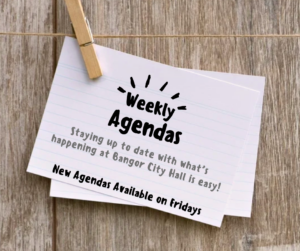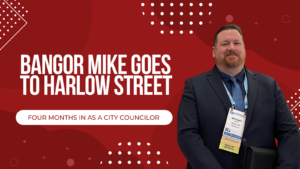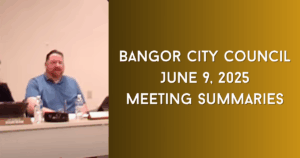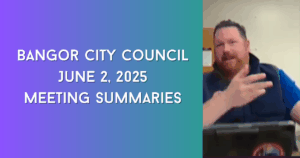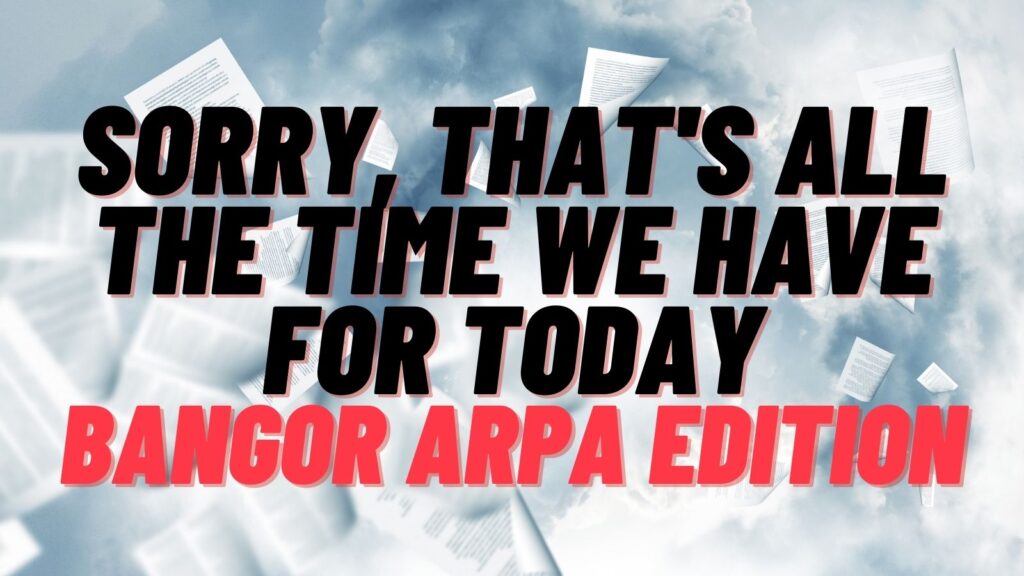
Last night the Bangor City Council sat down for a publicly accessible meeting about ARPA for the first time since their last meeting 7 weeks ago. The agenda is presented below. You can view the meeting recording at this link.
The meeting lasted for 1 hour 32 minutes. The first hour was spent on agenda item #2, specifically the Opioid Class Action Suit Settlement funds and potential uses. We learned that Bangor will be receiving $417,865, with additional annual payments of $85,000-$100,000 for the next few years.
The rest of the meeting was a race to beat the self-imposed 1 1/2-hour time limit. Some of the agenda was outright scrapped in the interest of saving time.
Public Health and Substance Use Disorder (SUD) Workgroups
Public Health is a crucial category to discuss, and Bangor has a need for services and programs to help with both mental health issues and substance use prevention and treatment. A matter this important really should have received its own meeting.
The Bangor City Council will be assembling workgroups of local experts to gather more information. Councilor Pelletier asked if these workgroups would be coming forward with an actionable plan with specific dollar amount requests. Which makes sense, right? You’ve got experts on the ground dealing with these issues and know exactly what is needed. The City Manager responded that the workgroups would return with a “more defined plan to present to you all for consideration.” The workgroups should return with whatever the City Council deems necessary. What does a “more defined plan” mean? By adding ARPA funds we’re talking potentially millions of dollars available to tackle this issue. For that kind of money, I think Bangor should be asking for a pretty specific plan. I’m concerned that these workgroups are going to be given vague instructions and end up presenting an overall plan that the City Council will cherry-pick from, much like they have done with the 2019 Housing Workgroup report. That’s not how problems get solved. Hasn’t worked for housing, and it won’t work for mental health and substance abuse.
The Results Will Only Be As Good As The Marching Orders
The people on the ground doing the hard work in this space are so knowledgeable about the people they serve. It is so underfunded in the greater Bangor area. I call on the Bangor City Council to give clear instructions to these workgroups. Vet ideas with a well-defined decision tree and focused questions along the lines of what Patty Hamilton expressed in the meeting: 1) If funding was available, what would it take to ensure mental health issues are being addressed for all that desire treatment? 2) If funding was available, what would it take to truly tackle substance abuse in our community and prevent future generations from being caught up in it? Those are the plans I would want to see.
Are They Workgroups or Consultants?
Councilor Pelletier followed up by asking if the Council could request a report from the workgroups within a certain amount of time. The City Manager’s answer doesn’t sound like actual workgroups to me. City Council will request another meeting in January at the earliest with the School Committee. Next, they’re going to have a community provider-based meeting in February, and a Detox group meeting in March. Each of these meetings sound devoid of actionable outcomes. Are these really workgroups which will devise a plan, or are they just inviting people to bounce ideas off of?
When you have multiple workgroups working on different issues, they can all work simultaneously. One doesn’t have to wait on the other. But, apparently that’s not what is going to happen here. Timing, lack of structured direction, and unclear goals will result in very little progress from these January, February, and March meetings just to discuss how to spend the $400K Opioid settlement money. This doesn’t even begin to address ARPA fund allocation. If the goal is to have more reasons to delay spending a penny of the ARPA money, this is the perfect plan. But if the goal is to meaningfully address SUD, gather a list of all the experts. Reach out to them all and ask them, “Would you be willing to work on a team with other experts in your field to create a comprehensive plan to solve this problem?” Appoint a chair for that workgroup and let them get to work! The 2019 Housing Workgroup prepared their first draft in 4 months. If we go with workgroups and give them the clear goal of defining how to solve the problem, we could be getting answers in April instead of just beginning the search for them.
In regard to having these workgroup meetings WITH City Council, that strategy will hurt this process. We’ve seen how much action they have taken with ARPA as a whole these last 19 months. Tell these groups to create a plan to solve these problems and present it with the cost. Then you can ask questions based on their presentation.
Job Training Assistance
Bangor, like most cities across the United States, could certainly benefit from job training. Trade skills need people more than ever, and if there was a solid program in place for individuals to get this training at little to no cost, the community as a whole would benefit. Just ask anyone who had to wait a week or longer this winter before someone was available to service their furnace. Even programs to help people get their Commercial Driver’s License (CDL) would be a tremendous boon for everyone. Saturday and evening Community Connector service stopped in Bangor because of a driver shortage. The city offered CDL training in the past, but the $1,000 price tag was too steep for most individuals who were interested.
Evidence exists showing Job Training programs are successful when implemented using a good strategy. A data-driven strategy. I hope the City Council will fund a process to create a report of the real shortages here in our community.
Matchmaker, Matchmaker, Make Me a Match
Councilor Leonard may have been on to something when he mentioned people sending in resumes and trying to connect people with businesses. I would take a slightly different approach. Instead of asking for resumes, I would create a database for businesses to add their job inventory, complete with required credentials/training. Individuals can browse the opportunities on a website, and should they find something of interest to them but lack the requirements for the position, they can reach out to the Workforce Development team to see how they can help with training/education. That alone sets it apart from traditional job search websites. In addition to being locally focused, making training available would expand horizons for many job seekers. In many cases it might just be on-the-job training that is required for a position, and individuals were not aware of it and didn’t apply. The biggest benefit of such a database is it would be constantly feeding Bangor real-time data about the job market.
But I caution City Council members to not lose sight of the fact that workforce shortages are not always the result of lack of skilled labor. Job quality also is a factor. The City Council should also work with businesses who are experiencing employee shortages to explore root causes and partner with them in the form of potential tax incentives to increase wages and improve retention. An employer can’t force someone to like their job but paying a starvation wage while having them do it is a recipe for resignations.
Aid to Nonprofits
Considering providing aid to nonprofits was glossed over quickly in the meeting. Nothing was covered regarding nonprofits who experienced a negative economic impact. What was mentioned by Councilors Tremble and Davitt is they do not believe there should be an open application process without a specific need identified by the City Council first.
One of my concerns is that Bangor will eventually do what Penobscot County has done and throw out an arbitrary number for grants and put a cap on what an individual organization can receive. It’s also a poor investment when there’s no coordinated plan for that money. Making local organizations scramble for a handful of $25,000 grants not attached to any sort of overall plan makes it feel like they’re awarding prizes for winning an art contest.
Penobscot County and Bangor are not alone in using that approach. It always seems to be that way with human tragedies like substance abuse and homelessness. When it comes to something like a sewer project, they have it costed down to the penny. You don’t see a city throwing out a number like $150,000 and asking how many feet of pipe that will get them. That’d be crazy, right? Well, that’s how things like homelessness get treated in this country.
Housing the Unhoused in Bangor
Bangor has a chance with these ARPA funds to change that. Why not set the goal of ending homelessness. Or, do what Built for Zero is supposed to be doing, get us to functional zero. That’s a more realistic goal. You will never completely end homelessness. Someone will always lose shelter from time to time. But you can put systems in place to make that experience brief for individuals and get them back into some housing.
The housing crisis in Bangor presents many challenges. There are, by some estimates, 200+ individuals living in tents. We have the short-term challenge of creating suitable shelter for them. We have the long-term challenge of creating permanent housing for them. This is in addition to the many others who are in shelters, couch-surfing, living in their cars, etc. They need housing too. We have the challenge of providing workforce housing for people who move to the city to provide much needed services, such as the medical profession. All of them need housing. And the city needs data on both the current stock AND current needs to have any chance at all to addressing the needs.
Bangor still has no actionable plan to house the unhoused. How in the hell are we going to come up with a plan when we don’t have all of the data necessary to make informed policy decisions and funding allocations?
A Good Plan Needs Good Data
We still don’t have a comprehensive and accurate by-name list for the city of Bangor. The city has abdicated their duty and is deferring to the Built for Zero program here in Maine. The Hub 7 coordinator says she is working on it. When will the list be ready for use in planning? Your guess is as good as mine. What is the hold up? Again, your guess is as good as mine. Are there not enough people to go out to gather data? Where’s the funding request for more people? Bangor City Council told the Hub 7 coordinator back in October to ask for anything she needs.
I understand gathering a by-name list is a detailed process. Not only does it include who each individual is, but it’s a complete inventory of needs on a person-by-person basis. A thorough intake can take anywhere from 1-2 hours. If only one person is dedicated to doing intakes, they are going to average about 4 intake sessions a day. If only a single person is doing it 5 days a week, it would take about 6 months to create a list of 500 people. If this is the process to compile the list, I would hope the state program empowered their hub coordinators to hire some help. Let’s say they put together a team of 4 outreach people doing intakes. Now we’re looking at 6 weeks at most to compile the list. Frankly this should have happened already, but hasn’t. Bangor needs that by-name list to create an inventory of needs. Let’s get it done.
What Do We Have? What Do We Need?
Bangor should start by going back to every single organization they talked to throughout the year and creating a complete inventory of available resources. When compared against our inventory of needs, Bangor would have at least a rough estimate of their shortfalls. How many ADA compliant shelter spaces do we have? How many more do we need? How many shelter spaces support couples? Families? How many more do we need? Knowing these answers would be a death knell for the false narrative that our unhoused neighbors are “shelter resistant”. Shelters are currently suited for single, sober, individuals without physical disabilities in need of accommodation. Everyone else is left to freeze outside when the few programs that can accommodate them are full.
Built for Zero had the promise of such a database with real-time inventory status showing what is available and what is taken. They’re still working on a coordinated entry system for individuals. A real-time inventory of resources, which could have been assembled simultaneously, is still a long way away at the current rate, so the city of Bangor is going to have to create this for itself.
Putting It All Together
With the resource inventory and the by-name list completed, Bangor City Council will have a complete picture for what it will take to solve this piece of the homelessness crisis. No single organization will be able make Functional Zero a reality all by themselves. It’s not supposed to. That’s not how it works. However, with the full picture, Bangor can break it into actionable pieces like a jigsaw puzzle. That’s when a grant process should start. Bangor City Council can ask community organizations for proposals outlining what piece(s) they can be responsible for, what would it cost, and how long it would take.
Once Bangor has identified enough proposals to solve the problem, that’s when they will know how much money to allocate. If it costs $5 million, then it costs $5 million. Maybe it’s 6, 7, or 8 million dollars. Maybe more. Maybe less. We won’t know without collecting all the data. That may seem like a lot of money to allocate, but remember, this is an investment. You’re investing in housing and shelters that will be reused to shelter future individuals who may experience homelessness. You’re investing in the framework that will make homelessness something temporary instead of hopeless. It’s the right thing to do, and it makes good fiscal sense as well. Creating housing for unhoused people now opens opportunities for them to give back to the community through employment, volunteerism, and community activism, which local businesses and this area needs. Not to mention studies have shown a decrease in public services cost to cities, and subsequently tax-payers, when homelessness is rare and brief. MOST importantly, it saves lives.
Future Meetings Should Make Better Use of Everyone’s Time
One of the biggest improvements Council can make is to receive “update reports” via email and reserve the face-to-face discussion for creating definitive, actionable items. They’ll get far more done that way.
After this meeting, it is clear each one of these topics should have had their own meeting. It’s unfortunate those meetings haven’t taken place already and we are just now, 19 months after Bangor learned it would be receiving the funds, beginning the real work of exploring ARPA fund allocation in earnest. The Council limited themselves to 1 1/2 hours. Because the agenda was not created with that time constraint in mind, as time was running out, the rest of the agenda was skipped or heavily glossed over. Out of all ARPA eligible possibilities, the housing crisis is the biggest issue facing Bangor, and it was discussed the least. When the City Council will convene next to discuss ARPA funding for housing specifically is anyone’s guess.
Meeting once about ARPA every 7 weeks with meetings conducted the way it was last night and during the previous ARPA meeting from November 1, I have no doubt it is going to be a long 2023 for anyone paying attention to the ARPA process with very little done in the areas where it matters the most, such as housing.
My hope is City Council proves me wrong, and next winter will find significantly less people stuck living outside in tents. This winter could have looked like that had City Council started seriously moving this ARPA allocation process forward last year.
